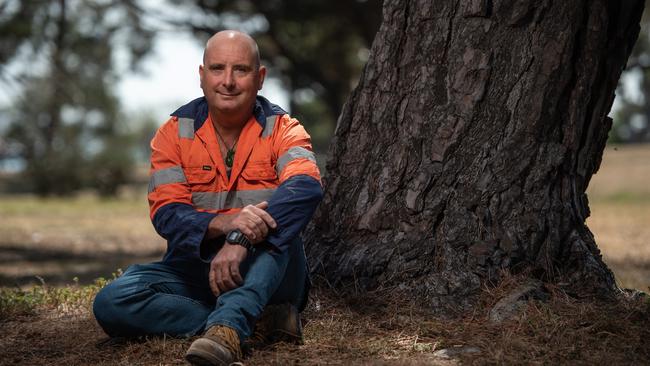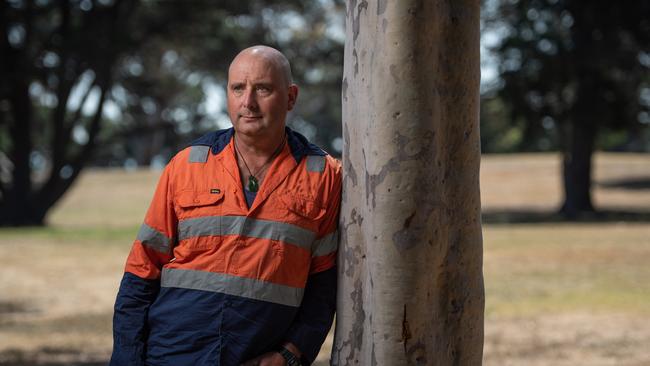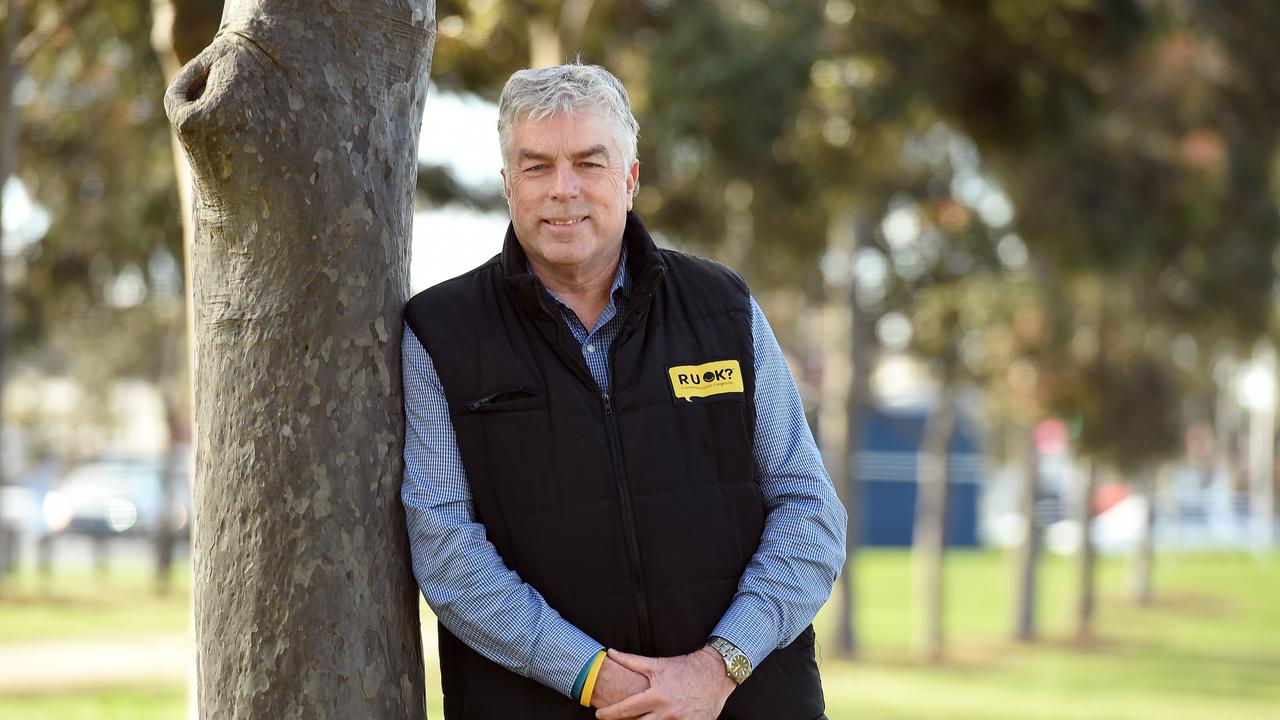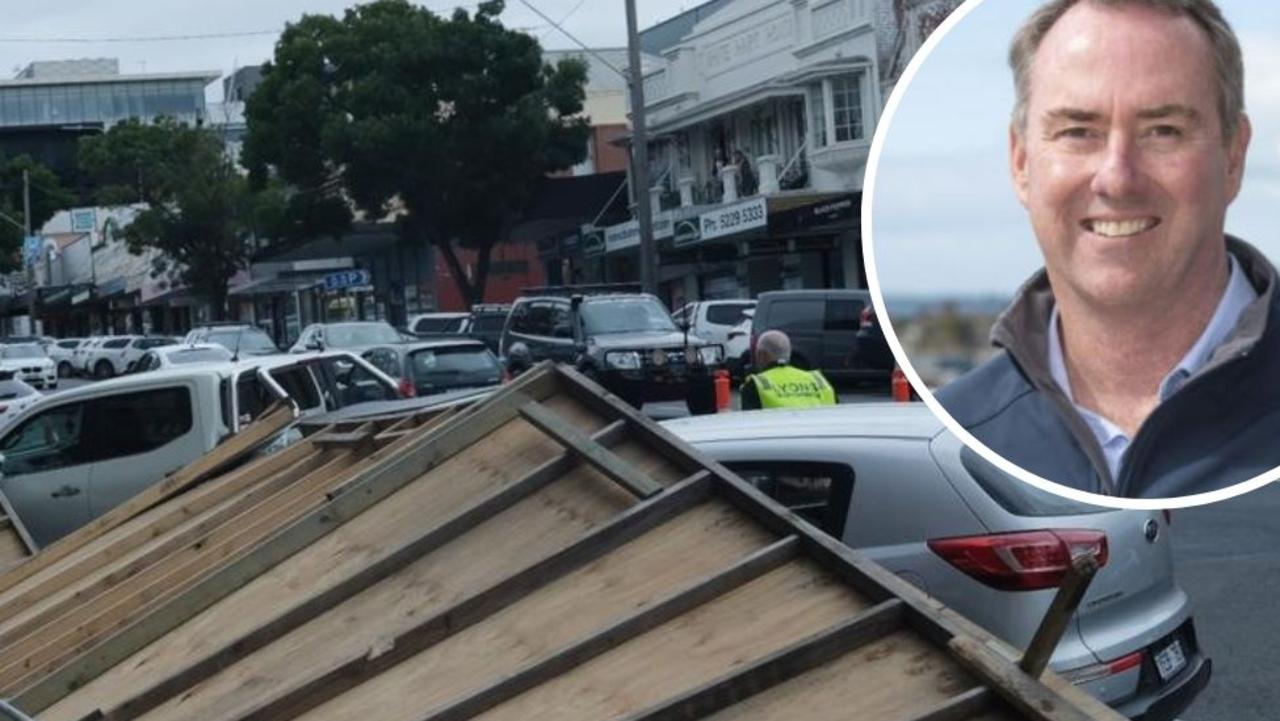Poor sleep red flag revealed Kiri Fausett’s mental health issues; Construction industry a hot spot
Winchelsea resident Kiri Fausett’s depression and post-traumatic stress disorder hadn’t been clear to him until a workplace forum. He shares his story for the first time.

Geelong
Don't miss out on the headlines from Geelong. Followed categories will be added to My News.
Trigger warning: Mental health, suicide, sexual assault
Kiri Fausett hadn’t recognised his depression and post-traumatic stress disorder until poor sleep was listed as a red flag at a work forum on mental health.
The Winchelsea resident, 49, has worked in construction for 25 years, and says he’s experienced a lot of trauma over his lifetime.
When he was a child living in New South Wales, he was molested by now-convicted pedophile Shane Walker.
At 18, Mr Fausett was in the State Emergency Service and looking for a young girl’s body, dragging a hook through the river from the back of a boat.
He says his boss remarked “we never find anybody this way”, but when Mr Fausett pulled the hook up, the girl’s hand came with it.

He also witnessed a 12-year-old girl being pulled out of a river by police divers.
Mr Fausett says he’s also had issues with a close relative, a methamphetamine addict, including some violent incidents.
But Mr Fausett and his wife of 22 years, Caz, say the situation that brought everything to a head was in 2005, with the Robert Farquharson case.
Farquharson was convicted of murdering his three sons on Father’s Day, and Mr Fausett had helped look for the boys in the dam they were deliberately driven in to.
Mr Fausett knew the father, and had seen him the night before.
Mr Fausett’s two sons were around the three boys’ ages, and had spent time playing with them.
He says his mental health declined after those events.
“I was in a real dark place,” he says.
“Even my boss (noticed), I remember I was just sitting in a corridor and he said ‘come into the office … are you alright?’.
“I said ‘yeah, yeah’ – but he could just tell.
“Then they got Tony (McManus) in for a talk.”
Mr McManus is a mental health advocate who works with construction firms to promote conversations that can save lives.
When he spoke at Mr Fausett’s workplace in August 2016, Mr McManus said poor sleep was among the red flags for mental ill health – the main symptom Mr Fausett lived with.
“While he was talking, I’m like, ‘yeah, I suffer that’ and, just in my own brain, ticking all of these boxes,” Mr Fausett says.
“I walked out of the function room, sat in my ute, and rang my GP.”
From there, Mr Fausett started on his road to recovery.
Mr Fausett says it wasn’t easy, trialling different psychologists and medications to find what suited him best and was effective.
Mr Fausett and his wife say it’s important for those in similar situations to persevere, and find what works for them.
A year after that initial talk at Mr Fausett’s workplace, Mr McManus returned for another forum.
Mr Fausett says after working through a lot of his trauma, and feeling grateful to Mr McManus for raising the red flag, he stood up in front of the 100 people to share his experience – and received a standing ovation.
Mr McManus says 30 per cent of the issues he engages with construction workers about are onsite issues, while 70 per cent relate to personal issues.
He says psychosocial hazards that can arise on construction sites include stress, fatigue, job insecurity, social isolation, workplace bullying and harassment, substance abuse, and trauma.
“It’s important for employers to address these psychosocial hazards by implementing measures to promote worker wellbeing, such as providing adequate rest breaks, promoting a positive work culture, providing opportunities for social interaction, addressing bullying and harassment, and providing access to mental health resources,” Mr McManus says.
He says the main personal issues that may impact workplace performance include health issues, stress and anxiety, substance abuse, family and relationship problems, financial concerns, work-life balance, grief and loss, lack of motivation, lack of sleep, lack of skills or training, personal conflicts, personal goals and aspirations, and cultural or diversity issues.

Mr McManus says employers can support workers facing these issues by fostering a supportive and empathetic work environment, offering employee assistance programs (EAPs), promoting work-life balance, providing resources for mental health and wellbeing, and offering flexible work arrangements when feasible – doing so can lead to enhanced workplace performance.
Eight years after the initial forum, Mr Fausett says he wants to become an advocate for mental health in the industry.
In his previous role as a supervisor, which he resigned from because of its impact on his mental health, Mr Fausett says he always made himself available to his workers to chat about anything on their mind – which he recommends all supervisors strive to do.
If he saw someone was struggling, he would take them for a private chat, and “get on the level” with them.
He says the main goal was to encourage people to get assistance when needed.
Mr Fausett says he knows how important this is from his personal experiences, but also from knowing seven people who died by suicide.
In 2022, 3249 people died by suicide, according to the Australian Bureau of Statistics (ABS), including 2455 males.
The suicide rate for males increased by 2.6 per cent from 2021.
According to WorkSafe, in the 2022-23 financial year, the construction industry was the second leading industry for claims with 167 made in the Geelong area including Greater Geelong, Surf Coast, and Queenscliffe, with mental injuries among the top three most common of all injuries.
Industry consultant and mental health advocate Shaun Reardon says the “shocking reality” is that Australia’s mental health system is “in crisis”.
Mr Reardon, who has 35 years’ experience in the Victorian construction industry, including as CFMEU assistant secretary and national vice president, says simply referring people in need to a help line is “not a solution”.
“Construction workers, like too many Australians, are not getting the treatment they need,” he says.
“Waitlists are out of control and essential access to services is out of reach, only adding further strains and stresses on someone’s fragile condition.
“We need reform and we need it now.”
Mr Fausett says there needs to be more knowledge about the stressors impacting construction workers in the broader community.
He says a good place to start is talking about mental health more on site, to reduce the stigma and encourage more men to speak up.
More Coverage
Originally published as Poor sleep red flag revealed Kiri Fausett’s mental health issues; Construction industry a hot spot






